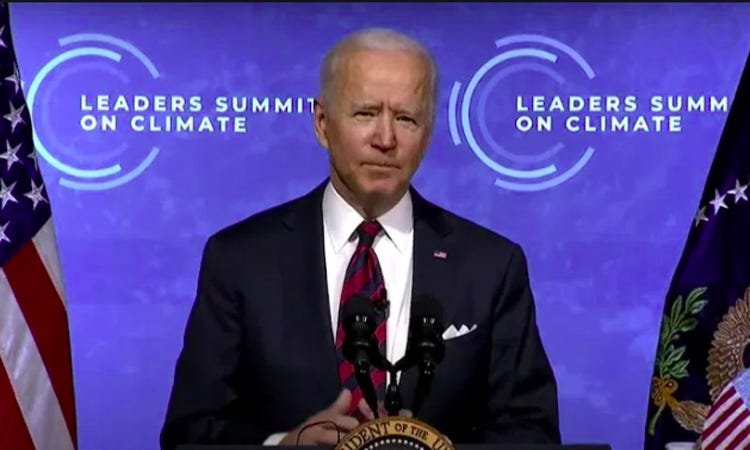Joe Biden’s presidency has made monumental contributions to addressing climate change and clean energy advancement, and much more can come in a second term. In fact, as I wrote for the Bulletin of the Atomic Scientists back when he was inaugurated in 2021, substantive, enduring climate action can only happen on timelines longer than a single presidential term.
Nonetheless, I think this post on Biden, climate policy and the election by
is vital not only to read but to share and discuss with friends. His main point is that, in presidential politics, climatism (see my webcast on that concept) is a self-defeating mistake.The post is behind a paywall. I’m a paying subscriber and think you should be too (and do chip in to sustain Sustain What as well). But here are a couple of key nuggets:
The crux
If you ask people whether they care about climate change, they generally say yes. If you’re a climate advocacy group that wants to make it look like people are deeply concerned about this, you can certainly hire pollsters who will craft questions that get you the answers that you’re after.
But if you probe public opinion even slightly, it’s clear that public support for climate action is a mile wide and an inch deep. For example, IPSOS found that just 25 percent of Americans said they’d be willing to pay higher taxes to address climate change. A 2019 Reuters poll asked specifically whether respondents would pay $100 to fight climate change and only a third said yes. Would you be willing to pay $10/month more in electricity bills to fight climate change? Most people say no.
If you haven’t seen my 2016 visualization of the shallow sloshy nature of surveyed climate attitudes, here it is again. Not much has changed, as Matty’s links attest.
The marvelous science communicator
(subscribe to her Thirsty Science Substack) did a cartoon rendition of my slosh proposal during a conference some years ago.Matty’s warning to climate-centric Democrats
[T]he climate movement keeps trying to push into the danger zone — according to Pew, there is very little support for completely phasing out fossil fuels or for banning gasoline-powered cars.
The larger context for that is while Americans care about the environment, they care about jobs and economic growth more than they care about getting to net zero as quickly as possible.
If you know Matty’s writing style you know these are just highlights, with vastly more context and nuance in the post.
Matty’s kicker:
“There’s a view that climate is such an existential threat that you have to go for broke every time. And there’s also a view that Donald Trump is an existential menace to the country, to the world, and to American democracy. I think the latter view is a lot more plausible than the former, and there’s a real choice to be made here. Part of the fight for democracy has to be a fight to give people the policies they want. On topics like prescription drugs, Democrats don’t need to choose between the ideal of democracy and its practice — the progressive policy is the policy most people want. But on climate, that’s not the case, and it’s important to be clear-eyed and make smart choices.”
I agree, which is why I think it’s fine for my old friend
to tell his followers this should be a climate election (“response diversity” is inevitable and fine), but it would be a big mistake for Biden’s White House and reelection teams to listen. More on that here:Let me know what you think about framing climate in the context of this year’s election.
Postscript: Lessons from Obama and 2016
I wrote a Dot Earth post after Trump’s win in 2016 that echoes much of what is above. Here’s a core section, focused on a “South by South Lawn” event at the Obama White House in October 2016:
Clinton’s defeat was a devastating political death of a thousand cuts — many self inflicted, others not. But this strategy of the green left was surely in the mix because it negated real concerns of working people facing economic uncertainty.
Obama recognized the importance of taking such concerns into account in hist great “South By South Lawn” climate conversation with the climate scientist Katharine Hayhoe and the actor and activist Leonardo DiCaprio:
“I think it is important for those of us who care deeply about this — and Katharine is a wonderful example of the right way to do it — to not be dismissive of people’s concerns when it comes to what will this mean for me and my family. Right?
So if you’re a working-class family, and dad has to drive 50 miles to get to his job, and he can’t afford to buy a Tesla or a Prius, and the most important thing to him economically to make sure he can pay the bills at the end of the month is the price of gas, and when gas prices are low that means an extra 100 bucks in his pocket, or 200 bucks in his pocket, and that may make the difference about whether or not he can buy enough food for his kids — if you just start lecturing him about climate change and what’s going to happen to the planet 50 years from now, it’s just not going to register.”
Here’s the excerpt from the White House video. Listen to Obama’s plea for addressing and honoring the economic concerns of working class voters.









Yes, see great new book -- Second Class: How the Elites Betrayed America's Working Men and Women by Batya Ungar-Sargon. And I will toe the line to get Biden reelected. At the same time, we are being lazy if we don't make the link between climate and economics -- whether is it job opportunities or the economic consequences of inaction. I spoke with an IPCC panelist at AGU shortly after the Paradise fires to ask about how they did their costing; turns out the full cost of rebuilding communities is not included. People also don't seem to register that we are all paying for FEMA checks, home insurance rates, planning commission meetings, mitigations, black lung disease costs, other health care costs related to fossil fuels*, mental health services, etc., not to speak of lost productivity, lost schooling, etc. People understand numbers, but we need to provide a full accounting of the true costs and help people connect the dots.
*https://prhe.ucsf.edu/press-release/petrochemical-proliferation-contributing-rise-health-problems#:~:text=Many%20petrochemicals%20are%20endocrine%2Ddisrupting,%2C%20cardiovascular%20disease%2C%20and%20infertility.
See also https://www.weforum.org/agenda/2023/10/climate-loss-and-damage-cost-16-million-per-hour/#:~:text=Follow-,The%20global%20cost%20of%20climate%20change%20damage%20is%20estimated%20to,%2C%20agriculture%2C%20and%20human%20health. Not that this will sway an impoverished American who needs to feed their family... But we can do better.
The polls say it all. Yglesias didn't even mention some of the most telling polls. When people are asked what issues they worry about, it turns out that for nearly everyone, climate change doesn't make the top ten.